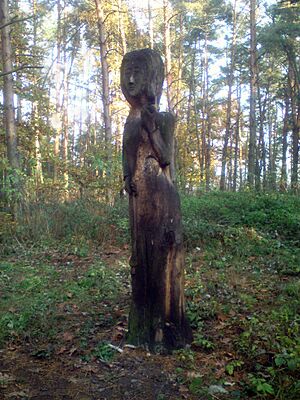Mokosh facts for kids

Mokosh (Old East Slavic: Мóкошь) is a powerful Slavic goddess of nature. She was very important to ancient Slavic people. They believed she watched over the Earth, water, and even how people's lives unfolded. Mokosh was seen as a protector of women and children. She also helped with farming and weaving.
Contents
Who is Mokosh?
Mokosh is one of the oldest and most respected goddesses in Slavic mythology. Her name might mean "moist" or "wet," connecting her to water and fertile land. She was often linked to the idea of "Mother Earth." People believed she brought life and growth to the world.
Goddess of Earth and Water
Mokosh was strongly connected to the Earth and water. Farmers prayed to her for good harvests. They believed she made the soil rich and helped crops grow. She was also linked to springs, rivers, and rain. These were all vital for life in ancient times. People thought she controlled the moisture that made plants thrive.
Weaving and Destiny
Beyond nature, Mokosh was also known as a goddess of weaving and spinning. These were very important skills for women. They made clothes and fabrics for their families. People believed Mokosh spun the threads of life and destiny. This meant she had a hand in how people's lives turned out. She was often shown with a spindle or a distaff, tools used for spinning thread.
Harvest and Protection
Mokosh played a big role in the harvest. She was seen as the one who blessed the fields with plenty. People would offer her gifts after gathering their crops. She was also a protector. She looked after women, especially during childbirth. She also guarded homes and families. Her presence was thought to bring good luck and safety.
Worshipping Mokosh
Ancient Beliefs
In ancient Slavic times, people honored Mokosh in many ways. They would leave offerings for her near springs, rivers, or special stones. These offerings might include threads, grains, or even small pieces of cloth. Women would often pray to her for fertility and healthy children. They believed she listened to their wishes.
Modern Connections
Even today, some traditions show a connection to Mokosh. For example, some folk customs still involve honoring the Earth. People might tie colorful ribbons to trees or leave small gifts in nature. These acts reflect the old beliefs in a powerful Earth goddess. Mokosh reminds us of the deep respect ancient people had for nature.
Images for kids
See also
 In Spanish: Mokoš para niños
In Spanish: Mokoš para niños
 | Madam C. J. Walker |
 | Janet Emerson Bashen |
 | Annie Turnbo Malone |
 | Maggie L. Walker |


